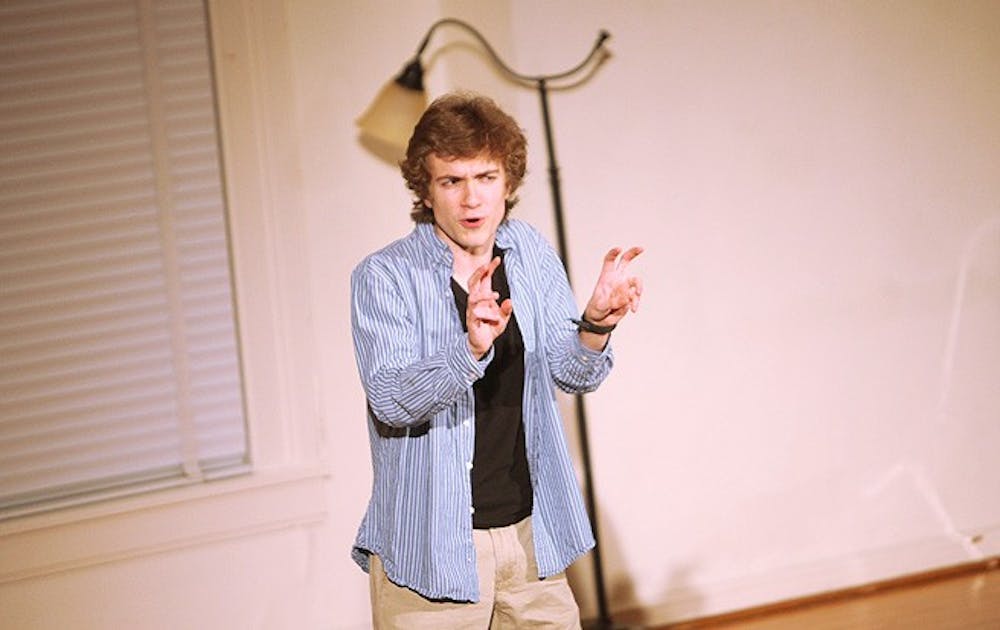When I entered Nelson Music Room for a Me Too Monologues rehearsal, the lack of hierarchy among the participants was surprising—but, at the same time, wholly reflective of Me Too’s aim to create a shared, candid Duke community. The actors and student director Naomi Riemer stood together in a circle onstage. Everyone was on equal footing, and although Riemer’s deliberate and animated gestures distinguished her from the cast as she gave them a run-down of the rehearsal schedule, her dictation came from within rather than above. The show, which seeks to spark meaningful conversation between students, practices what it preaches.
Since Priyanka Chaurasia (T ’10) founded the show in 2009, Me Too Monologues has presented a variety of monologues, all anonymously written and submitted by members of the Duke community. The performance seeks to spark meaningful conversations about identity and has expanded to include a diverse set of topics such as race, ethnicity, culture, gender, religion, class, sexuality, family and community.
Twenty of the 70 monologues submitted are included in this year’s line-up, which may be Me Too Monologues’ most diverse ever. At least two monologues were written by heterosexual men, while other monologues address previously untouched subjects such as disability, depression and what one writer describes as Duke’s “secret society” of virgins.
The production team was very intentional about seeking out heterosexual male voices in response to feedback from last year’s show, Riemer said. One monologue is a breakup letter written by a senior male to his freshman girlfriend, and the other is written from the perspective of a Jewish man who struggles with his promise to his grandfather to marry a Jewish woman.
Riemer attributes this increase in diversity both to personal outreach on the part of the production team and to new writers who stepped forward to respond to perspectives they disagreed with.
“People are motivated by what they didn’t see in the previous show,” Riemer said. “Other people who were frustrated by monologues that didn’t resonate with them last year took the time to share their take on a particular topic this year.”
Many of the monologues offer new perspectives on recurring issues such as lack of financial means, gender relations, eating disorders and rape.
“We didn’t want there to be just one overwhelming theme, which is what a lot of the feedback we got from last year suggested,” said assistant producer Tara Gavcovich. “We want people to remember several monologues when they leave the show, rather than just one or two.”
Me Too Monologues has become part of expanding efforts at Duke to create venues for more meaningful exchange between students of different backgrounds, as evidenced by the work of organizations such as the Center for Race Relations, which hosts Common Ground. On a campus where some students see the social scene as dictated by rigidly defined groups, Me Too Monologues allows students to listen to personal narratives about issues that they may not have considered before.
“I feel like the social scene here is very cut and dry, and people are in their separate groups,” said sophomore Imani Ifedi. “It’s kind of saddening. What I really like about this show, is that even if you don’t say ‘me too,’ your reaction can be, ‘Oh, that happens?’ Surprise is a very good reaction too.”
Senior Neha Sabharwal said that the anonymity of the monologues is one of the performance’s key strengths. Because the audience cannot match an author’s face with the story, they shed any preconceived notions or biases they may have had about the author and become more willing to consider another point of view.
“There’s a lot more buy-in with Me Too because there’s so much curiosity about who said it,” Sabharwal said. “Was it my best friend? Was it my roommate? That opinion could be anyone’s.”
Freshmen are jumping into the ring as well. Kari Barclay, who is performing in Me Too for the first time, said he worked with a few friends to start a forum for more meaningful conversation among freshmen as a project for his public policy class.
“We called it the Duke Dialogue Project,” he said. “We had facilitated meetings every Friday night to talk about things you wouldn’t normally talk about.” Barclay sees Me Too Monologues, like his class project, as a much-needed open forum for meaningful discussion between Duke students.
“Especially at this time of year, a lot of the discussions on the bus say, ‘Oh, where are you rushing?’ or, ‘Oh, what classes are you taking this semester?’” Barclay said. “It’s all the same conversations over and over again. Me Too gets to a deeper level of reflection and talks about things you aren’t going to hear on the bus.”
Me Too Monologues will be performed January 31-February 2 at 7:30 p.m. in Nelson Music Room. Admission is free. The first 45 attendees in line at each performance will receive free t-shirts.
Get The Chronicle straight to your inbox
Signup for our weekly newsletter. Cancel at any time.

